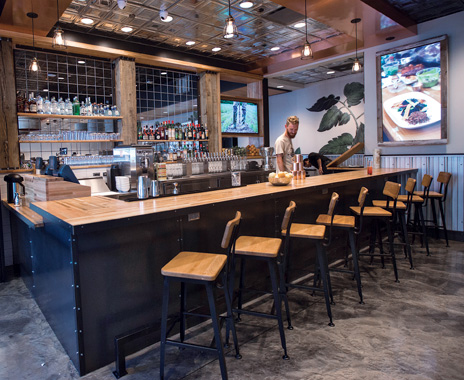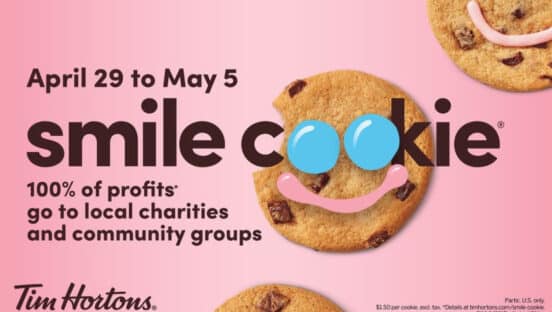Most politicians will tell you it’s hard as heck to be two things at once. But the temptation is always there to try, of course, because then you can conceivably appeal to twice as many people.
In this wacky election year, the trend of trying to be two things at once isn’t limited to candidates looking for votes. It’s entering the restaurant arena, too, as some savvy Fast Casual 2.0 restaurants are trying to remain true to the world of nutritional food and quick service even as they open full bars, bent on selling highly profitable beer, wine, and craft cocktails.
“Fast-casual operators adopting an alcoholic beverage program will allow them to ‘draft’ new customers,” says restaurant consultant Howard Gordon with a laugh.
The fast-casual move into alcoholic beverages is long overdue, Gordon says. By simply serving wine and beer, they will increase check averages a hefty $4, he says. Adding cocktails on draft boosts the check average even higher. “The real driver is to increase sales,” he says.
That’s certainly what the folks at Brider and Honor Society are hoping for. The two Denver-based Fast Casual 2.0 operations are attempting to lure Millennial diners not just with good, fair-priced, counter-service grub, but also with bar service. Keep in mind, Denver is the very city where trend-setting Chipotle helped to change the way younger consumers view, order, and eat their food.
For Bryan Dayton, co-owner and beverage director at Brider, which opened in mid-December, the rationale for offering bar service at his new restaurant in Denver’s lower downtown area is simple. “People want to have their cake and eat it, too,” he says.
The trend to offer full bar service fits within the sweeping changes brought forward by Fast Casual 2.0 concepts. These restaurants are offering enhanced food and beverage options, as well as premium hospitality and ambiance. After all, that’s what Millennials want. “We are Millennial driven,” says Dayton, whose bar offers four draft beers, four draft wines, and four draft cocktails.
Truth be told, Dayton’s not just doing it for the Millennials. He’s also doing it for the dough. Drinks at Brider fetch $7–$11 a pop. A full 20 percent of the restaurant’s sales are from alcoholic beverages, and his goal is to move that needle to 25 percent.
But it’s early. At press time, the restaurant had only been open a matter of weeks.
“What we’re doing today may be vastly different from what we’re doing one year from now,” Dayton says. There’s a learning curve for the owners—and the customers, he says. “It’s still a bit of a foreign concept to our customers,” he says. “They see our wall of taps and think it’s all beers.”
It’s these taps that vastly speed up the drink service, Dayton says. While an alcoholic beverage ordered from a typical casual-dining restaurant might take about 15 minutes to get during the busy dinner hour, getting a drink from Brider’s taps takes less than three minutes, he says.
There’s a rub, however, in limited choices. Millennials, of course, want limitless choices. “We may have to be more malleable, but I don’t want to add a lot of other things to it,” Dayton says.
So far, it’s working. Nearly 15 percent of customers are ordering drinks, he estimates. Business is good. “We’re in the hospitality business, and we wanted to add a hospitality that hasn’t been in the marketplace,” Dayton says.
Not too far across town, Rob Alvarado, principal partner at Honor Society, is trying the same thing. His restaurant, which has been open since August, sells eight wines, four beers, and four cocktails on tap. Unlike Brider, it also sells about 20 mixed drinks, primarily during happy hour. During busy dinner hours, Alvarado says, as many as 50 percent of customers order a drink from the bar.
“For us, it’s about getting a meal that you might get in a nicer tablecloth restaurant—but in a fast-casual setting,” he says. While his Millennial customers don’t have a lot of time or money, he says, “They still want the pleasure of a quick meal with a cocktail.”
This is all customer-driven, Alvarado adds. “It’s about hitting that consumer need.” The Denver market is awash in fast-casual brands, he says, but not many are offering what amounts to full bar service.
Unlike many fast-casual restaurants that are trying to siphon business away from their fast-food competitors, Alvarado says, Honor Society directly views its competition as more traditional casual dining. “It’s basically a fine-dining experience, but at the fast-casual level,” he says.
In the early going, Honor Society discovered that by offering too many mixed drinks, things were slowing down. So it trimmed the number of mixed drink offerings from 30 to 20. Drinks are popular at Honor Society, with about 20 percent of its sales coming from alcoholic beverages, Alvarado says.
Happy hour sales have helped. Because the restaurant is downtown, it attracts some office workers after work. Whenever it delivers meals to downtown offices at lunch, Alvarado says, it reminds customers of its happy hour specials.
The way Alvarado figures it, the bar “elevates” the dinner business, in particular. “If we didn’t have the bar, our restaurant would be a significantly different place,” he says.
Bottom line: It’s all about keeping Millennials happy. “Millennials are changing the world right now,” Alvarado says. “We’d better change with them.”









